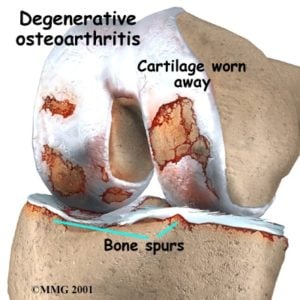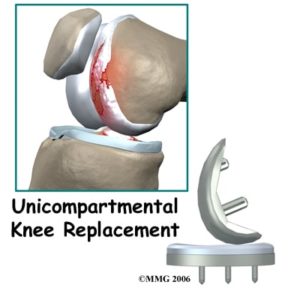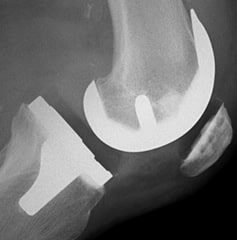
The pain due to severe osteoarthritis can be debilitating. If you have had injections, physical therapy, tried a brace and your pain remains awful it is likely that your surgeon will offer you a knee replacement. Choosing to proceed with a knee replacement is a big step. Many of you are wondering … “Should I have a partial knee replacement”?
Osteoarthritis pain will eventually significantly affect your quality of life. You will stop wanting to go outside, play with your children or grandchildren or even go out to dinner. Many of you will loathe having to go to the supermarket too.

Osteoarthritis pain is due to the loss of cartilage in your knee. When you lose the cartilage you have lost the cushioning that protects the ends of the bones. That will lead to pain. Initially the pain is only with walking, running, etc. Eventually the pain will be present all the time, and will frequently worsen at night. Some of you might feel that your knee will buckle or give out.
Knee replacement surgery is offered when other non-surgical remedies fail to control your pain. When you are talking with your surgeon, some of you may be offered the opportunity to consider a partial knee replacement.
Can I Have A Partial Knee Replacement?
A partial knee replacement is offered to patients who meet certain criteria. In order to be considered a good candidate for a partial knee replacement:
- you need to have osteoarthritis in only one part of the knee
- you can not be too heavy
- you can not have a significant deformity
- you do not have an ACL tear
- and your range of motion needs to be nearly normal.

A partial knee replacement only resurfaces one side of your knee joint. In the picture above you notice that there are two sides to the bottom of the femur. One is called the medial (or inner) femoral condyle and the other side if called the lateral (or outer) femoral condyle. If the osteoarthritis in your knee only affects the medial or the lateral side of the knee, and you meet the other criteria mentioned above, then you can be considered a candidate for a partial knee replacement.
Potential Benefits Of A Partial Knee Replacement
People with successful partial knee replacements generally enjoy more motion and a more natural feel to their knee than their total knee replacement counterparts. Other potential benefits of a partial knee replacement include:
- smaller incision
- less blood loss
- and a faster recovery
Many patients with partial knee replacements are up and around sooner than a patient with a total knee replacement. That being said, it is still considered a big surgery with significant potential risks.
Should I Have A Partial Knee Replacement?
It’s obvious that many of you would prefer to have a partial knee replacement over a total knee replacement. But one of the most important aspects of a successful partial knee replacement surgery is to choose the proper procedure for the proper patient. If your arthritis has spread to other parts of your knee and you have a partial knee replacement you may not have relief of pain. If you are too heavy the partial knee replacement might fail. If you have a prior ligament injury your knee might feel unstable or loose after a partial knee replacement.
If you are considering knee replacement surgery then you should talk to your surgeon to see if you are a candidate for partial knee replacement surgery. Hopefully this post will serve as a guide for you to have a open, meaningful conversation with your surgeon.
Do you have questions regarding an Orthopedic injury or longevity?
Do you want to talk to an expert who can listen to you for 45-60 minutes and explain the options in detail?
Dr. Howard Luks offers remote guidance sessions to review your X-ray or MRI images and explain your options.
Dr. Luks has also received hundreds of requests for educational sessions on the topics discussed in his book, Longevity Simplified.













Julian Marks
I had partial knee replacement in Oxford UK on 18 March. Recently the knee has become stiffer if I sit for any length of time and the knee feels warmer than the unoperated knee. It has become more painful and recently my ankle has temporarily become swollen.
I have just had a blood test and X-ray of the operated knee and I am waiting the results.
I possibly have been walking too much.
Any comment?
Very unlikely that walking too much will harm you. Inflammation following a partial or full knee replacement will take up to 6-8 months to fully resolve. The knee might stay warm, and swell with certain activities during that time frame. Assuming all tests look ok, and your doctor’s exams aren’t worrisome for infection, etc then I would not be worried.